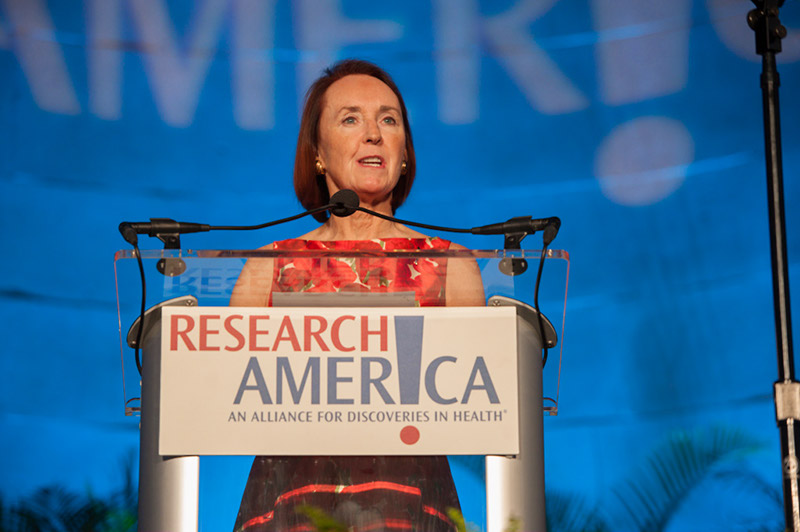We’ve Got Work to Do

Dear Research Advocate,
I don’t like to start letters with disappointing news, but it’s best to get to the heart of things. This week the Biden Administration released a budget proposal for Fiscal Year 2023 (FY23) that would provide grossly insufficient funding for NIH. The proposed 0.6% increase will not position our nation to address longstanding, emerging, and yet-unknown health threats, nor bolster our research capacity to ensure global competitiveness.
As a reminder, the President’s budget is a statement of Administration priorities that begins the appropriations process. Congress will be deeply involved in its execution, and we are confident our alliance and other NIH advocates can successfully make the case for robust growth in the Institute’s FY23 budget. More to come on this…
Other Budget News: In other ways, the President’s budget proposal would serve our nation in crucially important ways. For example, it proposes strong increases to the budgets of CDC (26.8%), FDA (10.7%), and NSF (18.8%). Research!America’s Ellie Dehoney is quoted in a Science article which overviews the President’s proposed science funding.
Read our statement on the FY23 budget and review our budget chart, which tracks health research agency budget numbers.
Pandemic Preparedness: The President’s FY23 budget also proposes $81.7 billion for a wide range of pandemic security measures, including funding for a global, public-private R&D partnership, the Coalition for Epidemic Preparedness Innovations (CEPI). If we stop thinking globally, hoping we can avoid the next variant or defeat the next pandemic without being an active participant in global pandemic preparedness and response, we are going to fail.
Check out a March 28 opinion piece in The New York Times by three scientists who study virus evolution. It describes (with great charts and graphics) the past and possible future evolution of SARS-CoV-2. It’s a helpful primer for understanding the arms race between humans and viruses and the urgent need to prepare. (Another resource: check out our updated COVID-19 Treatment and Vaccine tracker.)
HHS Secretary Xavier Becerra appeared before the House Appropriations Labor-HHS-Education Subcommittee today to discuss the Administration’s budget request, during which he stressed the need for additional pandemic funding before the next budget cycle. Negotiations are underway in the Senate to appropriate supplemental funds for the current fiscal year.
We fully support the need for pandemic funding now; read our briefing paper on the R&D imperative and use this editable email to weigh in with your Members of Congress.
ARPA-H: During the same hearing, Sec. Becerra outlined the planned structure for ARPA-H (watch his comments): the ARPA-H director will report directly to the HHS Secretary, while some functions (e.g. human resources, payroll, general counsel) will be housed within NIH. Research!America joined a statement reiterating strong support for ARPA-H and reinforcing the need to ensure funding for this new agency does not supplant funding for NIH.
PDUFA: On Monday, many of you joined us for an expert panel on the Prescription Drug User Fee Act (PDUFA). This landmark law bolstered FDA resources to speed up the process that determines the safety and efficacy of drugs. We discussed the history, impact, and policy issues that may arise during PDUFA’s 7th reauthorization process this year. The fate of PDUFA VII bears on every patient (and we are all patients). See a list of our panelists and watch the conversation.
S&T Imperative: CQ Roll Call and the Science & Technology Action Committee (STAC) partnered on an event this afternoon to discuss competitiveness legislation moving through Congress (H.R.4521; S.1260) and other federal science and technology priorities crucial for U.S. competitiveness.
A partial list of the all-star lineup: Sethuraman Panchanathan, PhD, Director of the National Science Foundation; Geri Richmond, PhD, Under Secretary for Science and Innovation, U.S. Department of Energy; and Rep. Frank Lucas (R-OK), Ranking Member, House Science, Space, & Technology Committee. The hour-long event is essential viewing.
Championing the Health of All Americans: Join communities across the U.S. in observing National Public Health Week, April 4 – 10, organized by the American Public Health Association. This year’s theme, “Public Health Is Where You Are,” recognizes that the places where we are, physically, mentally and societally, affect our health and our lives. Use the APHA’s toolkit to get involved.
Women in STEM: As Women’s History Month concludes, it’s fitting to share remarks by transformational leader Vivian Pinn, MD, Inaugural Director of the Office of Research on Women’s Health at NIH. Vivian made these comments during our 2022 Advocacy Awards Program, where we honored her many, many accomplishments:
“Young women today who are considering careers – especially in biomedical research, but in any aspect of STEM – I hope that they can see the [role] models that are out there… And where there is not equity of opportunity, it is up to us who are in these fields to make sure that those doors are open, so they do have not just a seat at the table, but a voice in decision making.”
If you missed the Advocacy Awards, we encourage you to watch the whole program, including the interview with Dr. Pinn.
Stay well, stay safe, and stay connected.
Mary Woolley




